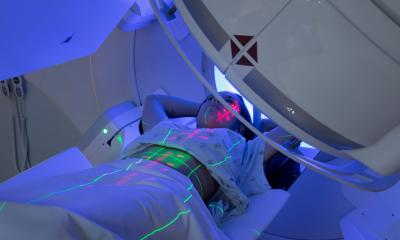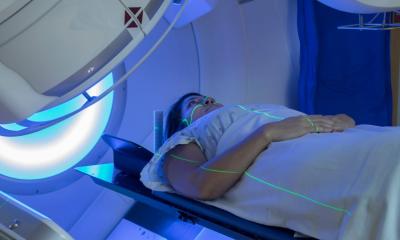© Mark Kostich – stock.adobe.com
News • Recurrence timeframe analysis
Breast cancer radiotherapy: new insights on duration of protective effect
Surgery followed by radiotherapy remains the standard care for women with early-stage breast cancer. Radiotherapy targets high doses of radiation to the breast to destroy any remaining cancer cells after removal of the tumour.
This protective effect is limited after a decade, when the risk of cancer recurrence is similar to that in those who have not received radiotherapy. The findings, published in the journal The Lancet Oncology, provide a more complete picture of the long-term benefits of radiotherapy following breast cancer surgery, experts say.
Surgery followed by radiotherapy remains the standard care for women with early-stage breast cancer. Radiotherapy targets high doses of radiation to the breast to destroy any remaining cancer cells after removal of the tumour. The Scottish Breast Conservation Trial, led by the University of Edinburgh, looked at 585 women who received treatment for early-stage breast cancer in Scotland – half received radiotherapy and half did not. The average follow-up period for patients was 18 years, with some cases followed for more than three decades.
Our evidence [...] supports the continued use of radiotherapy after breast-conserving surgery for most patients with early breast cancer. Like other anti-cancer treatments, radiotherapy loses its beneficial effects in the long term
Ian Kunkler
After 10 years, 16% of those who had radiotherapy had experienced the return of their cancer in the same location, compared with 36% of those who did not have the treatment.
Despite a reduction in cancer recurrence, survival rates did not improve with radiotherapy treatment. Average overall survival rates after 30 years were similar for those who received postoperative radiotherapy and those who did not – 19.2 years and 18.7 years, respectively. There were fewer deaths from breast cancer among those who received radiotherapy than those who did not – 37% versus 46%. By contrast, there were more deaths from other cancers in the group who received radiotherapy – 20% versus 11%.
Understanding the long-term impact of radiotherapy is increasingly important, as improvements in the detection and treatment of early-stage breast cancer mean that patients are living longer, experts say. "This 30-year study marks the longest follow-up of postoperative radiotherapy in the treatment of early-stage breast cancer," says Dr Linda Williams, from the Usher Institute at the University of Edinburgh and first author of the study. "Long-term studies like this, which go beyond 10 years of follow up, are crucial to fully assess the risks and benefits of treatments."
"Our evidence suggests that radiotherapy protects against cancer returning in the same breast for up to 10 years," adds Professor Ian Kunkler, from the University's Institute of Genetics and Cancer. "It supports the continued use of radiotherapy after breast-conserving surgery for most patients with early breast cancer. Like other anti-cancer treatments, radiotherapy loses its beneficial effects in the long term."
The study was funded by Exact Sciences and the Breast Cancer Institute, part of NHS Lothian Charity. The research team included experts from the Usher Institute and the Institute of Genetics and Cancer at the University of Edinburgh, Public Health Scotland, Queen Elizabeth University Hospital in Glasgow, and the Western General Hospital in Edinburgh.
Source: University of Edinburgh
09.08.2024











